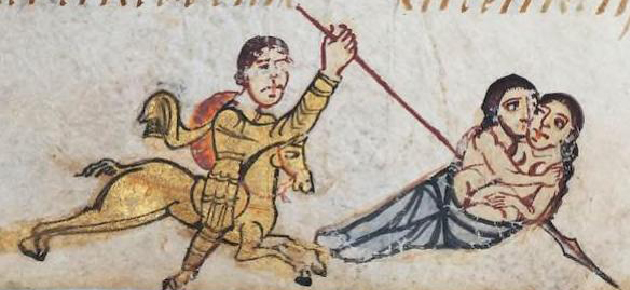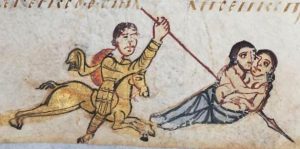 Mazel tov to our friends Beth and Yehuda Honig and to their extended families upon the birth of a granddaughter born to their children Natalie and Josh Honig. Welcome to the world Miraim Leah Honig. Mazel tov to Natalie’s parents Dalit and David Wizman and to their extended families. May Natalie and Josh be blessed to have only nachas from Miriam Leah, and from the (many) siblings to follow, Im’H.
Mazel tov to our friends Beth and Yehuda Honig and to their extended families upon the birth of a granddaughter born to their children Natalie and Josh Honig. Welcome to the world Miraim Leah Honig. Mazel tov to Natalie’s parents Dalit and David Wizman and to their extended families. May Natalie and Josh be blessed to have only nachas from Miriam Leah, and from the (many) siblings to follow, Im’H.
Raboyseyee and Ladies
In most of the civilized world, people who murder two individuals are typically sentenced to death or to life in prison. Not so in this week’s parsha where Pinchas, who just killed two, one male and one female -details to follow- gets none of those. Punk farkert (quite the opposite), he is rewarded; twice. He is? Indeed he is and his rewards come directly from the RBSO who vouches for Pinchas. Not too shabby for a double murder. Seemingly, some murders are sanctioned.
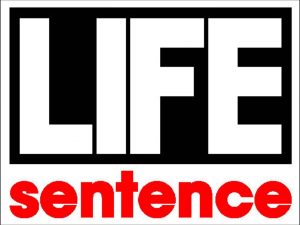 A thousand years later, he will get a third; his own parsha. Welcome to Parshas Pinchas, one of the most dizzying in Sefer Bamidbar where the action is fast and furious. Females are featured; one bad and five good ones, actually six when you count Serach bas Asher who gets a shout out this week and a whole lot more. Nu, since we didn’t learn too much Toirah last week, let’s get started with a shtikel look into Pinchas. Space permitting, we’ll also do a quick chazoro of the gantze parsha. If not, avada you should check out the archives; you know where – www.oisvorfer.com.
A thousand years later, he will get a third; his own parsha. Welcome to Parshas Pinchas, one of the most dizzying in Sefer Bamidbar where the action is fast and furious. Females are featured; one bad and five good ones, actually six when you count Serach bas Asher who gets a shout out this week and a whole lot more. Nu, since we didn’t learn too much Toirah last week, let’s get started with a shtikel look into Pinchas. Space permitting, we’ll also do a quick chazoro of the gantze parsha. If not, avada you should check out the archives; you know where – www.oisvorfer.com.
Pinchas, the choshovo grandson of Aharoin hakoihen, he with a reputation as a peacemaker, killed two people: one Yid, a tribal leader and his Midianite paramour who happened to be a shiksa princess. Shoin. So happens that he may have also inadvertently invented the beef kebob when he skewered on his spear the defiant Zimri son of Salu who was a prince of the tribe of Shimon and the Midianite princess, Cozbi daughter of Zur while they were engaged mamish in sexual activity. He did what? Does the heylige Toirah tell us this fact? It does not ober the medrish, of course, loves adding color so that we can get a visual. Everyone likes a visual. Some must have one, if you chap.
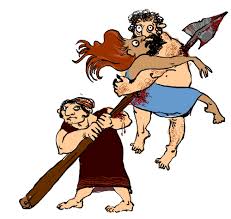 Says the medrish: since they were in the act mamish, Pinchas impaled the woman through her belly and aimed his spear between their male and female genitalia, yikes and ouch. Seemingly, his act, stopped the magayfo (catastrophe) during which the RBOS killed many thousands. Stop the presses! What went down here? And how does piercing them through their genitals prove that he did the right thing? Nu, let’s lay a proper foundation, as did Zimri, if you chap, by reviewing the last nine pisukim of last week’s parsha wherein we shockingly learned that the Yiddin had fallen prey to immorality and worse, with the daughters of Moiov. Basically the cunning Moabite meydlich (girls,) in a highly unusual move, mamish uncharacteristic for their profession, traded sexual favors not for money but for avoido zoro- meaning that they held back their goodies until the participating clients (Yiddin) served their god. No money down, just idol worship. Nu, can we blame these poor hapless Yiddin? How often does one chap a freebie when visiting with local talent? The price was right and Jewish: free! And as the parsha closed out, we learned that at least 24,000 received the death sentence for their lewd behavior.
Says the medrish: since they were in the act mamish, Pinchas impaled the woman through her belly and aimed his spear between their male and female genitalia, yikes and ouch. Seemingly, his act, stopped the magayfo (catastrophe) during which the RBOS killed many thousands. Stop the presses! What went down here? And how does piercing them through their genitals prove that he did the right thing? Nu, let’s lay a proper foundation, as did Zimri, if you chap, by reviewing the last nine pisukim of last week’s parsha wherein we shockingly learned that the Yiddin had fallen prey to immorality and worse, with the daughters of Moiov. Basically the cunning Moabite meydlich (girls,) in a highly unusual move, mamish uncharacteristic for their profession, traded sexual favors not for money but for avoido zoro- meaning that they held back their goodies until the participating clients (Yiddin) served their god. No money down, just idol worship. Nu, can we blame these poor hapless Yiddin? How often does one chap a freebie when visiting with local talent? The price was right and Jewish: free! And as the parsha closed out, we learned that at least 24,000 received the death sentence for their lewd behavior.
Seemingly (so says the Medrish), more than 24,000 participated in the free sex act, no surprise here, ober the RBSO was appeased after Pinchas took matters into his own hands by killing Zimri and Kosbi. Had Zimri done the same, if you chap, perhaps he would have lived longer. Why them? Vart (wait), we’re getting to them. At the end of the day, the sex wasn’t free; it cost the lives of more than 24,000. Another Medrish will tell us that many others were hung and in total over one hundred thousand died. Ver veyst.
As an aside, though not parsha related, mistama you recall that one of the reasons we count the sefira is because of a later generation where the 24,000 students of Rebbe Akiva died due to their lack of respect for one another. Coincidence, ver veyst?
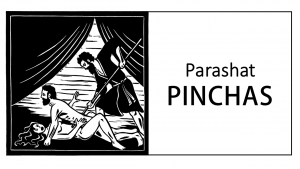 Why did Pinchas kill these two? Because they were having sex! Is sex a death sentence? It was for them! Why? The emes is that these murders, as stated above, took place and were taka mentioned in the last nine pisukim of parshas Bolok (last week’s parsha) but the incident is repeated, even though we are taught that the heylige Toirah does not have any extra words, even letters. Oib azoy (if so), why is the myseh, or parts of it, taka repeated? Because, there are new facts to be told; the killer and the victims are identified by name. Last week, the killer and his victims were only referenced but not identified. This week, we are introduced to Pinchas, Zimri and Kosbi. More on them below.
Why did Pinchas kill these two? Because they were having sex! Is sex a death sentence? It was for them! Why? The emes is that these murders, as stated above, took place and were taka mentioned in the last nine pisukim of parshas Bolok (last week’s parsha) but the incident is repeated, even though we are taught that the heylige Toirah does not have any extra words, even letters. Oib azoy (if so), why is the myseh, or parts of it, taka repeated? Because, there are new facts to be told; the killer and the victims are identified by name. Last week, the killer and his victims were only referenced but not identified. This week, we are introduced to Pinchas, Zimri and Kosbi. More on them below.
Though we’ve previously discussed Pinchas, this year the Oisvorfer dug up a few more interesting medroshim and also reviewed the heylige Gemora on this polarizing topic and individual that shed some new light on his actions and the rewards issued by the RBSO in the aftermath of his acts. One thing is zicher; he definitely killed 2 people and there was some controversy about how to judge him. The heylige Toirah and other places in Scripture loved him; others, including many medroshim, not so much. He was either a hero or a villain.
The facts: he seemingly witnessed Zimri and Cozbi bas Tzur (princess of Midian and daughter of King Bolok) having sexual relations at the entrance of the Oihel Moied, not very nice. Instinctively or maybe because he was witness to the RBSO’s fury over the Yiddin chapping the Moabite mydlich while also behaving very poorly, he chapped his spear and speared them through their genitals, ouch. Why would Pinchas take the law into his own hands and kill these two people, ver veyst? Who appointed him sheriff, ver veyst! Did he seek permission from the RBSO or Moishe? He did not! And what was their crime? Was his act lawful? So many questions. Seemingly, their big sin involved having an open sexual encounter in public view. So says the Medrish. Nu, some enjoy being seen and zicher most enjoy watching; is that so giferlich? Ober is that a reason to be killed? Does one get the death penalty for having chapped from a shiksa? Usually not! Moreover, weren’t we taught that if a person has uncontrollable desires davka he should chap from a shiksa? Indeed we were.
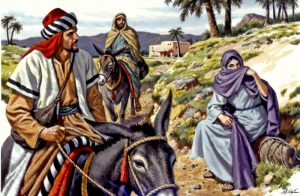 Says the Medrish (Tanchuma (Buber), Parshas Va-Yeshev 13, s.v.va-yered Yehuda) azoy: “………..There are cases of people who commit adultery and are rewarded, while others commit adultery and lose; ……………. Someone who committed adultery and lost, Zimri; who committed adultery and won, Yehuda (of course), who chapped Tamar. They had Peretz, then Chetzroin. This mishpocho was destined or efsher rewarded, to become the ancestors of Dovid Hamelech and eventually, one day soon, to none other than the Moshiach himself. Nice!
Says the Medrish (Tanchuma (Buber), Parshas Va-Yeshev 13, s.v.va-yered Yehuda) azoy: “………..There are cases of people who commit adultery and are rewarded, while others commit adultery and lose; ……………. Someone who committed adultery and lost, Zimri; who committed adultery and won, Yehuda (of course), who chapped Tamar. They had Peretz, then Chetzroin. This mishpocho was destined or efsher rewarded, to become the ancestors of Dovid Hamelech and eventually, one day soon, to none other than the Moshiach himself. Nice!
Asks the Medrish azoy: why was he called Zimri ben Salu? Answer: he was called Zimri because he, from his seminal emissions, became white like a beaten egg (beitzah-muzereth). Multiple emissions? Seemingly, he double dipped, if you chap and enjoyed many. He is called Zimri ben Salu because he called attention to (silsel) the sins of his family. And why was she called Cozbi? She was faithless (kazvah) to her father [by consorting with Zimri]. Alternatively, she said to her father “kos bi” (slaughter through me). Meaning, use me to slaughter and cause the death of Yiddin. She was seemingly successful; 24,000 died.
As stated above, he got two rewards, the first being the covenant of the kahuna (priesthood). In plain English: he was appointed to be a koihen. Ober had you read and remembered the second paragraph wherein we learned of his lineage and specifically that he was the son of Elozor and the grandson of Aharoin the koihen godol, of course you must be wondering about this special gift. So, if his father was a koihen and his grandfather was not just a koihen but the big kahuna, one would assume that he too was a koihen and taka unless he was the adopted son, it would appear that Pinchas was taka a koihen from birth. And shtelt-zich-di-shaylo (the question arises), why would he need this special gift and what sort of a reward was this for a man that so pleased the RBSO? Taka an excellent kasha and of course Rashi and many others pontificated over this very topic.
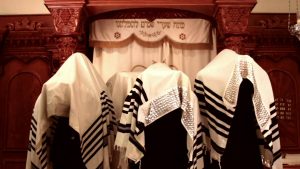 Moreover, according to some big guns including the Chizkuni and the Abarbanel, Pinchas was taka a koihen and served as one before this episode. Was he getting ice in the winter?Nu, a few suggest that Pinchas was taka a koihen but was afraid of being defrocked from the kehuna for his violent acts. The taking of a human life, especially two, were/are seemingly grounds for being defrocked. Marrying a divorcee, not always. Accordingly the RBSO declared that his actions notwithstanding, he and his offspring would not be penalized. Gishmak but does everyone agree? Of course not! And the heylige Gemora (Zevochim 101b) cites two different opinions on the issue. Said Reb Chanina azoy: Pinchas did not become a koihen until he killed Zimri. Shoin! And his proof? The very words of the RBSO in this week’s parsha where he made Pinchas the koihen. Case closed! Maybe he was adopted, ver veyst.
Moreover, according to some big guns including the Chizkuni and the Abarbanel, Pinchas was taka a koihen and served as one before this episode. Was he getting ice in the winter?Nu, a few suggest that Pinchas was taka a koihen but was afraid of being defrocked from the kehuna for his violent acts. The taking of a human life, especially two, were/are seemingly grounds for being defrocked. Marrying a divorcee, not always. Accordingly the RBSO declared that his actions notwithstanding, he and his offspring would not be penalized. Gishmak but does everyone agree? Of course not! And the heylige Gemora (Zevochim 101b) cites two different opinions on the issue. Said Reb Chanina azoy: Pinchas did not become a koihen until he killed Zimri. Shoin! And his proof? The very words of the RBSO in this week’s parsha where he made Pinchas the koihen. Case closed! Maybe he was adopted, ver veyst.
Ober said Rav Ashi (ibid.) azoy: he was not included among the kohanim until an incident as described in the Novee (Yehoshua 22:30) several years later, in which he brought peace between the tribes. In other words; though the RBSO Himself appointed Pinchas as a koihen, his kihuna only became effective and operative however, and for whatever reason, until years later when he brought peace to the fighting shevotim. Why were they fighting? Seemingly two of them built a mizbayach (altar) under suspicious circumstances. Pinchas helped prevent the episode from escalating into civil strife or even war. Seemingly, in that case, Pinchas acted as the peacemaker, efsher as atonement for his violent reaction with Zimri. After showing a gentler side of his personality, his kahuna was activated.
In any event, both agree that Pinchas did not have natural rights because when he was born to his father, his father did not yet have the kihuna to pass on to him and that he was not old enough to receive the distinction when it was given to Aharoin and his sons.
And the bottom line? After all the debates and medroshim about Pinchas and the rewards the RBSO bestowed upon him, it epes appears that taking the law into one’s own hands, especially in a violent manner, is not a good thing. And it taka took divine intervention, a nod from the RBSO Himself, to clear his name and actions. Zealotry, unless directly so ordered from higher authorities, is epes not a model of proper behavior under normal circumstances.
And says the heylige Gemora that had Zimri’s family sought revenge for the killing of Zimri, they might have been well within their rights of a revenge killing. And had Zimri fought back and killed Pinchas, he would have been exonerated. Self-defense as a defense would have carried the day. Only special treatment protected him from the wrath of Zimri’s family.
Says the heylige Gemora azoy: following the killings, members of sheyvet Shimoin (Shimon’s tribe) advanced on Pinchas intending to kill him. Pinchas was terrified and seemingly fainted. “His soul departed”. Assuming that he was dead, the Shimonites withdrew. After they left, the souls of Nodov and Avihu (the two dead sons of Aharoin) entered the body of Pinchas and he was revived. Oh my.
And read this for the shabbis tish. Why were these two long departed souls chosen to enter? How do dead souls wake up another dead person? Ver veyst but of course it could be, why not? Efsher you recall that these two guys died because they, like Pinchas, had an intense desire to draw close to the RBSO. They had zealously offered unauthorized sacrifices. Similarly, Pinchas zealously killed Zimri: both acts without formal authorization from the RBSO or Moishe. Nadav and Avihu sought to have their souls corrected by Pinchas who channeled his zealousness in accordance with the RBSO. Gishmak!
Wait; there’s more. As another reward, he receives the ‘peace prize’ directly from the RBSO. Said the Radak (Shoiftim 20:28) azoy: Pinchas lived more than 300 years. He merited such long life because of the blessing he received in our parsha. Ober says the Ibn Ezra that the brocho Pinchas received was that Zimri’s brethren should not exact revenge and kill him.
So, was Pinchas a good guy? It appears the he was and some suggest that he was so great, that he is also Eliyohu (Elijah). He is? Says the Medrish (Yalkut Shimoni 772) azoy: Pinchas never died. “Pinchas still exists.” And said Reb Shimon ben Lakish azoy: Pinchas is Eliyahu. Shoin!
Ober what is the basis for believing, as some do, that Pinchas might taka be Eliyahu? Seemingly, Eliyahu is depicted as a zealous prophet who said of himself “I am zealous for the Lord” (Milochim (Kings) I, 19:10. Like Pinchas before him, Eliyahu never died, but, in a whirlwind, ascended heavenward, there to undergo re-education. Pinchas, say some, did the same, ver veyst.
A gittin Shabbis
The Heylige Oisvorfer Ruv
Yitz Grossman
